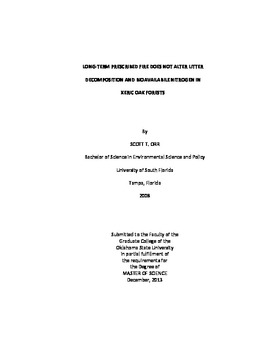| dc.description.abstract | The Cross Timbers is a patchwork of grassland, savanna, and xeric oak forest that stretch across Kansas, Oklahoma, and Texas. Historically a pyric ecosystem, burning of the Cross Timbers became infrequent. Currently, land managers are increasingly using prescribed fire as a tool to increase biodiversity, reduce woody encroachment, and decrease wildfire risk. Understanding the effects fire has on litter decomposition is important due to its impacts on carbon storage, nutrient cycling, and erosion. Nitrogen volatilizes in fire and this can reduce the bioavailable nitrogen that, in turn, lowers litter quality. Previous studies have shown that lower litter quality can slow decomposition. Fire can also affect decomposition environment, resulting in altered microbial communities, arthropods, litter depth, moisture, and temperature in the litter layer that can change the rate of decomposition. The objective of our study was to determine whether fire frequency effects on litter quality and decomposition environment alter the rate of decomposition. Litterbags were installed at three wildlife management areas in Oklahoma that have been periodically burned for at least 24 years. Litterbags were collected every three months for a period of 15 months. Major findings of our study were decomposition environment did not affect the rate of decomposition under a closed canopy with fire frequency between 0 and 4.6 fires per decade, and differences observed in litter quality decomposition rates were not due to fire, but some other unexplored mechanism. | |
